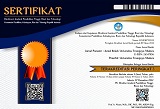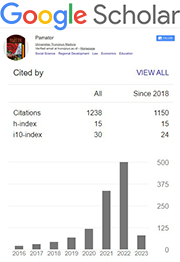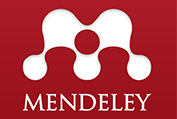The Role of the Arabic Language in Enhancing Intellectual Intelligence of Students at UIN Maulana Malik Ibrahim Malang
Abstract
Full Text:
PDFReferences
Akhdan Nur Said, Diana Rahmawati. “Aplikasi Strategi Dan Model Kecerdasan Spiritual (SQ) Rasulullulah DiMasa Kini.” Spiritual Intelligence The Ultimate Intelligence VII, no. 1 (2018): 21–32.
Akhiril Pane. “Urgensi Bahasa Arab; Bahasa Arab Sebagai Alat Komunikasi Agama Islam” Urgensi Bahasa Arab; Bahasa Arab Sebagai Alat Komunikasi Agama Islam 2, no. 1 (2018): 77–88.
Aman, Moh. “Bahasa Arab Dan Bahasa Al-Qur’an.” Jurnal Kajian Islam dan Pendidikan Tadarus Tarbawy 3, no. 1 (2021): 300–308.
Aryani, Wiwik Dyah, Iis Salsabilah, E S Mubarok, and Dudung Ali Nurdin. “Problem Terhadap Perkembangan Kecerdasan Dan Solusinya Perspektif Syariat Islam.” Jurnal Pendidikan Indonesia :Teori, Penelitian dan Inovasi 2, no. 4 (2022): 43–53.
Bulkisah. “Pembelajaran Bahasa Arab Pada Perguruan Tinggi Agama Islam Di Indonesia.” Jurnal Ilmiah Didaktika 12, no. 2 (2012): 308–318.
El-yunusi, Melikai Jihan, and Tutik Hamidah. “Memahami Kandungan Al- Qur’an Menggunakan Metode Asbab Nuzul, Munasabah, Dan Siyaq.” IBTIDA’TV: Jurnal Prodi PGMI 7, no. 2 (2022): 40–48.
Gamayanti, Nurfitri Yulianti Witrin dan. “Meningkatkan Minat Belajar Bahasa Arab Dengan Penerapan Metode Bernyanyi Dalam Pembelajaran Kosakata Di Masa Pandemi Covid 19.” Proceedings UIN Sunan Gunung Djati Bandung 1, no. 60 (2021): 32–43.
Has, Muhammad Zaky Sya’bani & Qois Azizah Bin. “Relevansi Bahasa Arab Dalam Dakwah : Refleksi Atas Kedudukan Bahasa Arab Sebagai Bahasa Al-Quran (Tinjauan Literatur).” Ath-Thariq ; Jurnal dakwah dan komunikasi 7, no. 1 (2023): 97–111.
Kosim, Abdul. “Nama-Nama Pesantren Di Bandung Raya.” Kalamuna: Jurnal Pendidikan Bahasa Arab dan Kebahasaaraban 2, no. 1 (2021): 1–23.
Lintang, Daud. “Bahasa Arab Sebagai Identitas Budaya Islam Dan Pemersatu Keberagaman Suku.” Ta’limi | Journal of Arabic Education and Arabic Studies 2, no. 1 (2023): 73–86. https://journal.stai-nuruliman.ac.id/index.php/tlmi/article/view/60.
Maghfiroh, Nazilatul. “Bahasa Indonesia Sebagai Alat Komunikasi Masyarakat Dalam Kehidupan Sehari-Hari.” Jurnal Ilmiah Ilmu Komunikasi 19, no. 02 (2022): 102–107.
Mailani, Okarisma, Irna Nuraeni, Sarah Agnia Syakila, and Jundi Lazuardi. “Bahasa Sebagai Alat Komunikasi Dalam Kehidupan Manusia.” Kampret Journal 1, no. 1 (2022): 1–10.
Muhammad Abdurrasyid Ridlo, Susanti Vera, Ecep Ismail. “Studi Tematik Hadis Tentang Keutamaan Membaca Al-Quran.” In Gunung Djati Conference Series, 93–103, 2022.
Noermanzah. “Bahasa Sebagai Alat Komunikasi, Citra Pikiran, Dan Kepribadian.” Prosiding Seminar Nasional Bulan Bahasa (Semiba) (2019): 306–319. https://ejournal.unib.ac.id/index.php/semiba.
Risna, Safriana, Abdullah, Nurul Ilmi, Wahdaniah Putri Rahmah, Siti Aqila Maysarah. “Keistimewaan Bahasa Arabsebagai Bahasa Al Qur’an.” Journal Of Arabic Studies 2, no. 2 (2023): 1–14.
Samad Umarella, Mahatir Afandi Attamimi,. “Implementation of the Theory Multiple Intelligences in Improve Competence of Learners on the Subjects of Islamic Religious Education in Smp Negeri 14 Ambon.” al-Iltizam: Jurnal Pendidikan Agama Islam 4, no. 1 (2019): 73.
Septiarini, Ni Made Astri, and A .A.N. Eddy Supriyadinata Gorda. “Kecerdasan Intelektual, Kecerdasan Emosional, Kecerdasan Spiritual, Budaya Organisasi Dan Kinerja Karyawan.” Jurnal Manajemen dan Bisnis 15, no. 4 (2018): 24–41.
Shafaunnida, Arzi. “Kecerdasan Manusia Menurut Al- Qur ’ an ( Literatur Riview ) Pendahuluan” 8, no. 2 (2022).
Susilawati Muharram, Raodatul Jannah, Darmawati. “Implementasi Metode Pembelajaran Bahasa Arab Yang Efektif Untuk Anak Usia Dini.” Educandum 9, no. 1 (2023): 1–8.
Syarif, Muhammad. “Perkembangan Kecerdasan Intelektual, Emosional Dan Spiritual Anak.” Jurnal Pendidikan dan Pengajaran 2, no. 1 (2023): 31–42.
Syarifah. “Konsep Kecerdasan Majemuk Howard Gardner.” Jurnal Kajian Mutu Pendidikan 2, no. 1 (2023): 31–42.
Yuangga Kurnia Yahya, Umi Mahmudah, Luthfi Muhyiddin. “De-Sakralisasidalam Pembelajaran Bahasa Arab Di Indonesia: Analisis Bahasa Sebagai Identitas Agama.” Jurnal Lingua Applicata 3, no. 57–70 (2020).
DOI: https://doi.org/10.21107/pamator.v17i1.24238
Refbacks
- There are currently no refbacks.
Copyright (c) 2024 Nevin Nismah, Zakiah Muftie Daradjah, Ihsan Muhammad Saefullah Syaiful Mustofa

This work is licensed under a Creative Commons Attribution-ShareAlike 4.0 International License.
Jurnal Pamator : Jurnal Ilmiah Universitas Trunojoyo by Universitas Trunojoyo Madura is licensed under a Creative Commons Attribution-ShareAlike 4.0 International License.















.png)